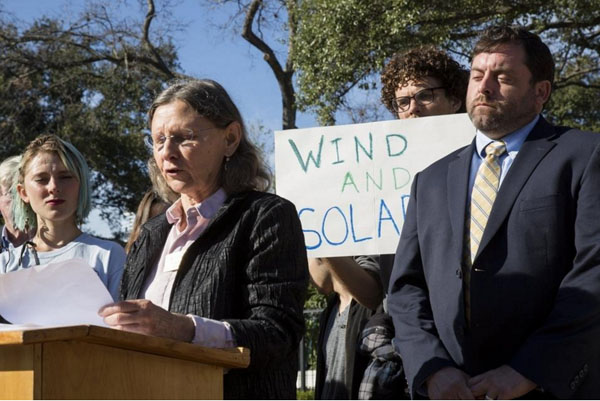January 8, 2019
By Jeremy Schwartz jschwartz@statesman.com
Austin American-Statesman

Emily Northrop, professor of economics and business at Southwestern University, speaks during a news conference Tuesday outside the Governor’s Mansion. About two dozen climate scientists signed a letter addressed to Gov. Greg Abbott discussing climate change and how action is needed to cut global warming pollution.
A group of Texas climate scientists on Tuesday urged Gov. Greg Abbott not to “stick your head in the sand” when it comes to the impact of climate change on the state and urged him to take steps to reduce Texas’ greenhouse gas emissions, which are the highest in the country by a wide margin, according to the U.S. Energy Information Administration.
On the first day of the 2019 legislative session, the group delivered a letter to Abbott’s staff at the Capitol, signed by two dozen university professors in Texas, offering to brief the governor on climate science.
“You don’t need to be a scientist to accept the science on climate change,” said Emma Pabst, clean energy associate with Environment Texas, at a news conference in front of the Governor’s Mansion before delivering the letter.
The letter came in response to Abbott’s December comment about the role of climate change in fueling Hurricane Harvey, which did $125 billion in damage in Texas, more than any other natural disaster in U.S. history except Hurricane Katrina, according to a state report.
Pressed on the relationship between hurricanes and a changing climate during a news conference, Abbott said, “I’m not a scientist, and it’s impossible for me to answer that.”
The state’s “Eye of the Storm” report, which detailed the devastation wrought by Hurricane Harvey, doesn’t mention the term “climate change, ” but calls for “future proofing” Texas against natural disasters likely to bring “more severe precipitation events.”
The report, which was overseen by Texas A&M University System Chancellor John Sharp and included contributions from more than two dozen researchers and extension agents in the Texas A&M System, is perhaps the closest the governor’s office has come to acknowledging climate change — while avoiding that exact, politically charged term, except in citations of scientific papers.
The report steered clear of recommending policies to tamp down carbon emissions in Texas. The state, which also leads the nation in renewable wind energy, produced 657 million metric tons of carbon in 2016, 5 percent higher than the year before and nearly twice as much as second-place state California, according to the Energy Information Administration.
The scientists called on Abbott to undertake a series of actions, including updating building codes, incentivizing electric vehicles and limiting fossil fuel infrastructure.
The groups also urged more specific action, including ordering regular inspections of natural gas extraction sites to better regulate harmful methane emissions, and directing the Texas Public Utility Commission to increase its energy efficiency goals.
While the recommendations were aimed at Abbott, Cyrus Reed of the Lone Star Sierra Club also urged passage of a newly filed bill by state Rep. Eric Johnson, D-Dallas, which would require state agencies to incorporate climate change forecasts into their long-range and budget planning.
“It’s a simple bill,” Reed said.
A 2018 Yale Climate Opinion survey found 56 percent of Texans believe global warming is mostly caused by human activities, just a hair below the national rate of 57 percent.
The U.S. government’s National Climate Assessment recently warned that, by the late 21st century, temperatures in Texas could climb by more than 8 degrees, with an additional 30 to 60 days of 100-degree-plus temperatures and extreme heat that could result in hundreds of more heat-related deaths and greater risks to outdoor agricultural workers.
Statesman staff writer Asher Price contributed to this report.